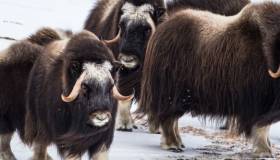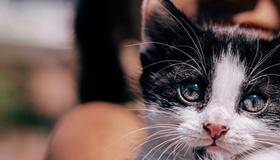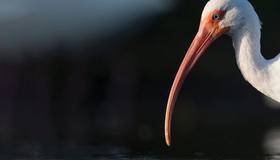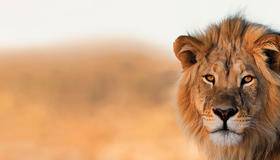
October 19, 2021 – The harsh climate of the Arctic would make some researchers head for the hills, but Dr. Susan Kutz loves the wildlife and the people who inhabit this area at the top of the world. She’s devoted her career to understanding the impacts of disease in this fragile ecosystem.
Dr. Kutz is a Professor in the Department of Ecosystem and Public Health at the University of Calgary, and a Foundation-funded researcher who studies diseases in Arctic wildlife. She’s also mentoring Dr. Juliette Di Francesco, a Foundation fellowship recipient.
Dr. Kutz’s interest in muskoxen started with a worm – a lungworm, to be precise. The lungworm in question had recently been discovered in muskoxen, but no one knew much about it. Dr. Kutz jumped at the chance to work with the charismatic species, although at first, she wasn’t much excited about studying parasites.
“I had a great mentor in Dr. Gary Wobeser, a professor of wildlife disease, who convinced me to do the project,” said Dr. Kutz. “It’s not often you get to study a new species of parasite!”
It was during this early work that Dr. Kutz experienced a pivotal point in her personal and professional life that has guided her on subsequent projects.
“My big aha moment came when I was a young scientist, thinking that muskox lungworm is so cool, and going to the Arctic is cool. Then I learned about the central role of the muskox to the Indigenous people of the North,” said Dr. Kutz. “The muskox is embedded in their culture and history, and their sense of well-being. This was a turning point for me.”
Dr. Kutz’s work is now done in full partnership with local communities. She’s found that through these collaborations, documenting the traditional knowledge held by Indigenous people provides invaluable insights into the ecology and health of muskoxen and other wildlife species.
“The Inuit harvesters can tell us immediately about the health of the animals – are they fat, are they skinny, are there young ones, are they sick,” said Dr. Kutz. “A similar survey conducted by conventional means could cost tens of thousands of dollars and take years to accomplish!”
The team’s research also serves as a bridge between government wildlife managers and Inuit organizations as they work in partnership to make joint decisions based on science as well as traditional knowledge. The team’s latest project is focused on disease in caribou.
Thank you to all Morris Animal Foundation donors who support this critically important work through their generous gifts. It’s only possible because of you.




